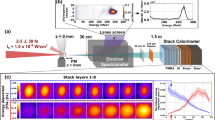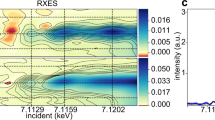Abstract
THE atomic X-ray absorption coefficients of the elements have commonly been represented by simple formulæ of the type τa = kZxλy(k a factor involving fundamental atomic constants, Z the atomic number of the absorbing element, λ the wave-length of the X-rays, x and y exponents not very different from 4 and 3 respectively). These formulæ have been derived in a variety of ways (J. J. Thomson, A. H. Compton, L. de Broglie, H. A. Kramers), and the complete expression for the absorption coefficient of an element over all ranges or X-ray wave-lengths has been represented as the sum of a number of such terms—each term corresponding to the fluorescent excitation of a distinct series or sub-series (K,L1.…), and dropping out for wave-lengths longer than that of the corresponding absorption edge. Experimental determinations of the absorption coefficients have shown fair agreement with theory, both with respect to the general run of the coefficients on each side of a discontinuity, and to the magnitudes of the discontinuities.
This is a preview of subscription content, access via your institution
Access options
Subscribe to this journal
Receive 51 print issues and online access
$199.00 per year
only $3.90 per issue
Buy this article
- Purchase on Springer Link
- Instant access to full article PDF
Prices may be subject to local taxes which are calculated during checkout
Similar content being viewed by others
Author information
Authors and Affiliations
Rights and permissions
About this article
Cite this article
ROBINSON, H., YOUNG, C. The Absorption of X-Rays. Nature 123, 203–204 (1929). https://doi.org/10.1038/123203b0
Issue Date:
DOI: https://doi.org/10.1038/123203b0
Comments
By submitting a comment you agree to abide by our Terms and Community Guidelines. If you find something abusive or that does not comply with our terms or guidelines please flag it as inappropriate.



